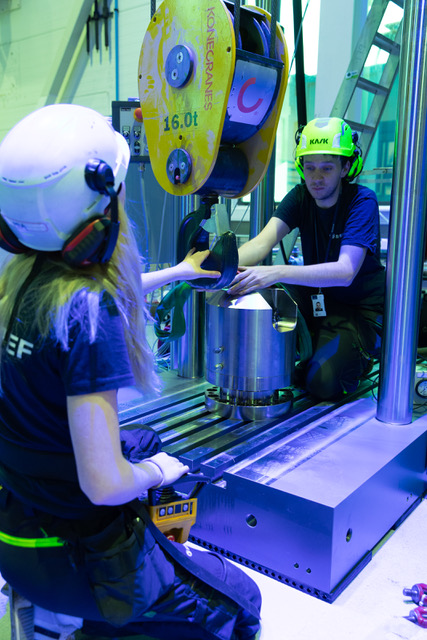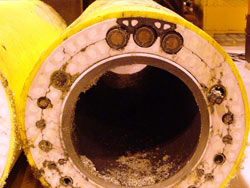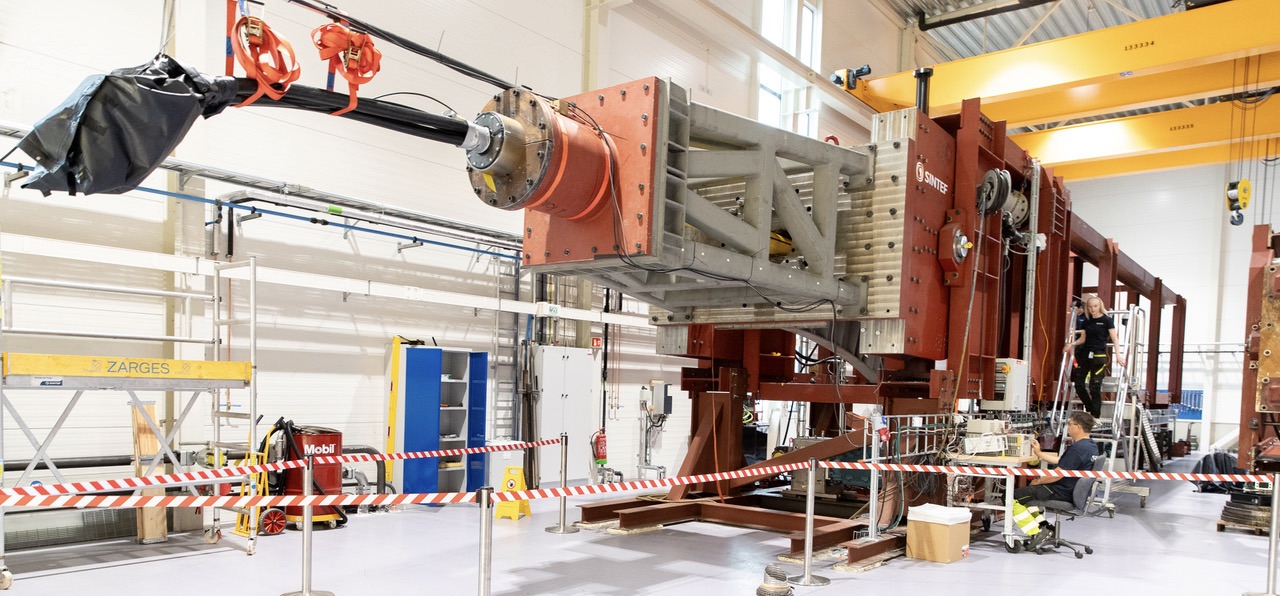Marine structures lab - IMT
Marine Structures Laboratory
The main activities in the laboratory are the testing of structures, structural components and materials. Typical problems involve fatigue testing, ultimate strength and collapse testing, testing for serviceability, and advanced materials testing.
Experimental work is often combined with analytical or numerical analysis.
A wide range of structural analysis programs are available for linear and non-linear static and dynamic analyses. These include special programs for fatigue and fracture mechanics analysis, and the collapse behaviour of intact and damaged structures.
The Marine Structures Laboratory is operated by the division of structural engineering at SINTEF Ocean in cooperation with the Marine Structures group at the Department of Marine Technology.
The laboratory is certified to ISO 9001. Test procedures are also aligned with API 17J, API17B, Cigrè TB623, and Cigrè TB862.
Main installations
Strong Floor: The marine structures laboratory is equipped with a strong floor with an area of 12 000 mm x 7 800 mm.
The strong floor is fit with built-in fixation points at an interval of 600 mm in both the length and width directions which makes it efficient to build special test rigs upon specific requests.
Maximum vertical point load at the fixation point is 1 MN and maximum horizontal point load in either direction is 2 MN. Maximum bending moment is 1MNm about the horizontal axis.
Hydraulic power: Primary and secondary rings 270 l/min, 280 bar.
Actuators: A range of servo- hydraulic and -electric actuators for static and dynamic testing, from 3 kN load capacity to a maximum load/stroke of 4000 kN/500 mm.
Control system: Several computerized systems for multi-actuator control, fatigue load simulation, data logging with on-line reduction and analysis.
Rig system: Modular frame system which can be built to accommodate specimens and structural models with a wide range of shapes and sizes, under unaxial or multiaxial loading, and with load capacities up to 4000 kN.
Monitoring: A wide range of state-of-the-art monitoring systems are available.
Materials and construction technology - fields of research
Fatigue testing
High performance dynamic actuators with load capacities up to 4000 kN with hydraulic grips Brand-new universal rigs with capacity/stroke of 500 kN/400mm and 100 kN/250mm are also available.
The test rig is integrated with a universal work bench which enables efficient testing using user-defined setups.
A wide range of load programs, including randomized load sequences with variable or constant rms levels and variable signal bandwidth and also includes:
- environmental chambers for low temperature testing
- seawater testing with temperature control and cathodic protection
Material testing
A number of test rigs are available for material testing. Various of material testing can be performed in these rigs, which includes tensile property testing, friction coefficient testing, and single-wire fatigue testing etc.
The purpose of the material testing is to create comprehensive databases of material properties.
These databases will serve as a foundation for precise predictions regarding the physical properties of the end products, facilitated by advanced numerical modelling techniques.
Collapse testing
Maximum load capacity/stroke 4000 kN/ 500 mm in closed loop control. Large models can be tested under controlled conditions of multiaxial loading to obtain the buckling and collapse characteristics of intact and damaged structures.
Fracture testing
Realistic models of wide plates, pipelines, risers, tether elements and tubular joints can be tested to fracture at temperatures down to -50 degrees.
Facility for testing of flexible pipes and umbilicals
There are two test rigs for full scale dynamic testing of power cables, flexible pipes and umbilicals.
- Configuration: Horizontal, in a test frame on the laboratory floor
- Pipe model: Length 23 m flange-to-flange
- Two independent modes of loading: tensile axial loading at one end, bending loading at the opposite end
- Bending load capacity: 1 MNm dynamic, 30 degrees tilt static, ± 30 degrees dynamic
- Axial load capacity: 4.0 MN dynamic, 500 mm stroke dynamic
- Load signal: State-of-art digital control electronics, computerised load generation The system accepts any sequence of peaks and troughs, e.g. generated by a block program to be specified by Client.
- Pressure: Internal pressure of the pipe up to 700 bar
- Environment: Oil or water filled pipe model, ambient room temperature
Instrumentation for the measurement of:
- Number of cycles
- Internal temperature of the pipe
- Temperature in outer armour layer
- Ambient temperature
- Internal pressure
- Applied tension
- Rocking angle
- Strain in armour layers and steel tubes by fiber optics or conventional strain gauges
- Radiography and gamma-ray techniques
- Acoustic emission monitoring
- Acceleration measurements
- Strain gauge and fibre-optic Bragg assessments of tensile armour wires,
-
• • Digital image capturing (DIC) for curvature measurements along the bend stiffener region.
Facility for
- Conditioning of the pipe at 125 oC internal temperature, 700 bar pressure
- Leak testing at 110 % of design pressure, ambient temperature
-
Hydrostatic testing to 150 % of design pressure
Small scale test facility for flexible risers
Fully equipped structural laboratory for tests on flexible pipe components.
- Small scale tests of tensile armour, effects of fretting contact, wear, sea water with gas mixtures (CO2, H2S, N2)
- Assessment of the SN design curve
- Dedicated test facility for wear testing of composite tensile armour
- Small scale tests of hoop stress profiles, component tests, fatigue and wear
- Fatigue and ultimate strength tests of armour components anchored in epoxy
- Wear of anti-friction layers, effect of elevated temperature
Test rig for creep and fatigue testing of electrical conductors
Dynamic testing at variable tension, curvature, and temperature.
- Tensions from 0 - 25 kN
- Curvatures from 0.5 - 10 m-1
-
Continuous monitoring of electrical resistance of both screen layer and conductor phases are provided in close collaboration with SINTEF Energy. These techniques have become integral components of our standard full-scale testing of marine slender structures.
Full-scale compression-bending testing
Full-scale rig to test power cables and umbilicals subjected to cyclic and combined compression and bending loads.
The purpose of the full-scale compression-bending testing is to replicate operational conditions which may trigger lateral armour-buckling in a cable or umbilical exposed to combined axial compression and cyclic bending.
In-situ bending property testing
Several test rigs are available for bending property testing of flexible risers, umbilicals, and power cables. The testing can be operated either in three-point-bending or four-point-bending configurations.
Our novel three-point-bending test rig is integrated with the full-scale fatigue test rigs. This integration allows axial tension to be applied during bending property testing, making it the most reliable method for determining the intrinsic bending properties of test samples, particularly for power cables.
Torsion testing
A conceptual torsion test rig has been built for better understanding of torsional behaviour of marine slender structures.
The results will be essential in calibrating numerical tools for calculating the torsional capacity of marine slender structures, a failure mode that is not well understood by industry.



